Devs fume over Runtime per-install fees: "The breach of trust is so insane that it's impossible to stay with Unity"
The announcement of the Unity Runtime Fee has caught many developers off guard. Here is what the professional community has to say about the company’s decision to charge extra fees based on game installs, as well as the lack of a clear explanation and rationale for the new pricing model.
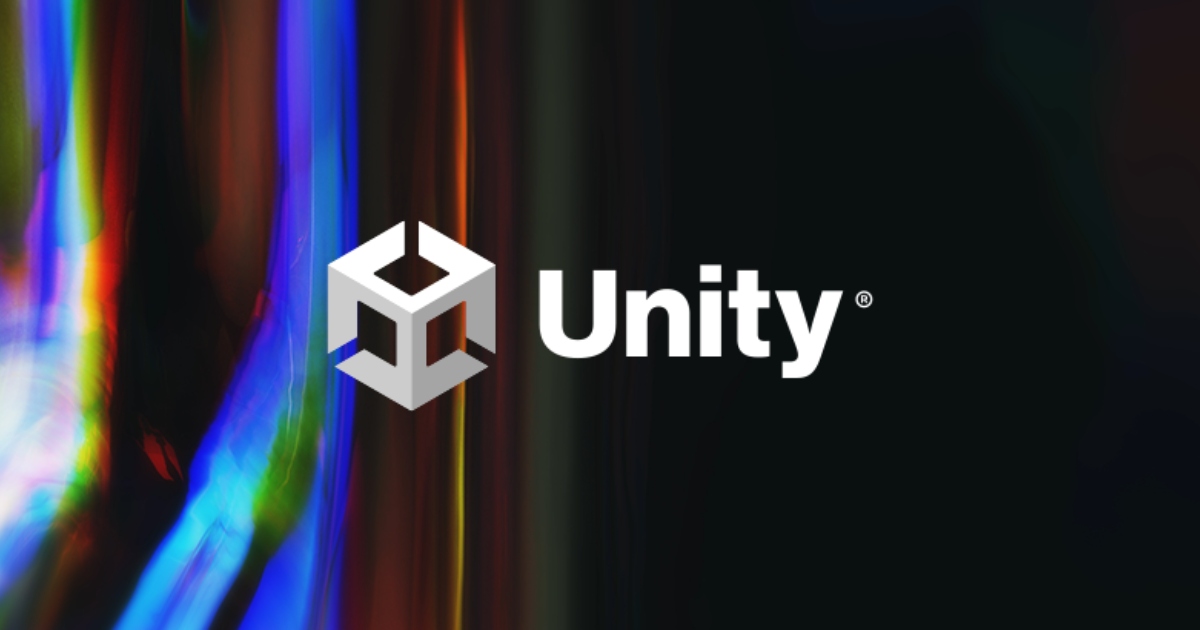
What happened?
On September 12, Unity announced the so-called Runtime Fee, which will be charged for every install above certain thresholds starting January 1, 2024.
For example, for devs using the free Unity Personal plan the criteria are $200k in revenue in the last 12 months AND 200k lifetime downloads. After that, the company will charge $0.20 for every install above the threshold.
We detailed all the changes in our article (link above), but here are the key points that take into account further clarification from Unity:
- Unity track installs with its “own proprietary data model,” although it is unclear how exactly it works or how developers will be able to verify this data;
- Devs using other Unity services like LevelPlay or Unity Gaming Services will be able to receive special discounts from the company;
- Unity will only charge for an initial installation, so re-installs won’t count;
- Fees will be applied if the same user installs a title on another device (e.g. playing a game on Steam and then installing it on Steam Deck);
- Charity games and charity bundles will be free of charge;
- Demos are free of charge unless they include the download of the full game (as in the case of Early Access titles);
- Fees for games distributed via subscription services like Game Pass or PS Plus are said to be charged to distributors (Microsoft or Sony), not developers;
- Unity promises to protect developers from fraudulent and abusive practices (e.g. install-bombing), saying that it has “fraud detection practices in our Ads technology.”
Why do developers criticize the Runtime Fee?
The biggest issue with the announcement of the Runtime Fee, besides its controversial nature, is poor communication and the lack of proper explanation on Unity’s part. Even after some clarification following the initial backlash, many developers still have questions about the upcoming extra fees.
Odd Tales founder Tim Soret perfectly summed up some of these concerns: “How can we trust that they won’t raise the price per install later? That they won’t force us to add an always-online DRM or a Unity login for our customers? Or that they won’t change the business model randomly again? How can we even trust the numbers they provide? How can they discard false positives like piracy?”
Game designer Tom Francis, who worked on games like Gunpoint and Heat Signature, called the rollout of the Runtime Fee an “astonishing scumbag move,” adding that a “partner who can and will change how much of your revenue you owe them after you’ve made and released your game needs to be avoided like the plague.”
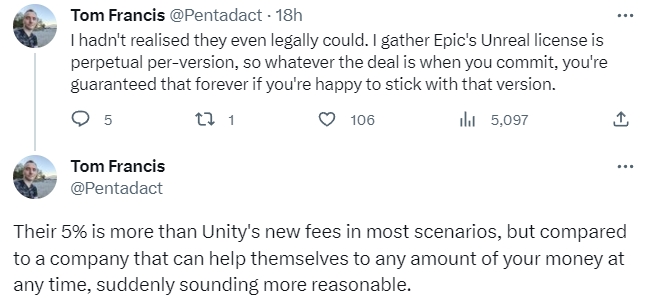
Image credit: Tom Francis
The Falconeer creator Tomas Sala doesn’t expect Unity to retract the changes: “If this was a well crafted switcheroo for a less offensive plan after pitching a horrible plan, the it is the most disorganized , disheveled and ill prepared feint ever.” Sala also criticized the company for trying to sell additional services to developers in exchange for lower fees, calling the move illegal and “just cartoonishly evil.”
George Broussard, co-founder of Apogee (3D Realms), criticized the way Unity handled the Runtime Fee rollout and overall communication with developers. “How much brand damage was done and how much faith burned?” he said, also calling the situation a “chaotic mess.”
While Broussard thinks “your average Steam developer will be just fine,” he added that “a few will have to pay pennies after making tons of money. Some will pay a lot after making millions. I think mobile devs might be in for a world of pain. Margins are super thin there.”
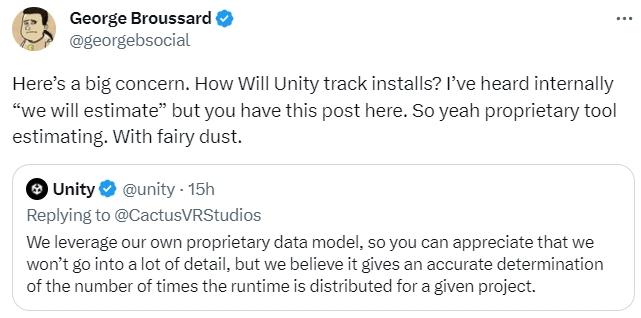
Image credit: George Broussard
Necrosoft Games director Brandon Sheffield published a blog post titled “The Death of Unity.” He believes that the new Runtime Fee will add more admin work for developers, making it “extremely costly for games like Vampire Survivor to sell their game at the price they do.”
“As a developer who starts a game under the personal plan, because you’re not sure how well it’ll do, you’re punished, astoundingly so, for being a breakout success,” Sheffield explained. “Not to mention that sales will now be more costly for developers since Unity is not asking for a percentage, but a set fee. If I reduce the price of my game, the price Unity asks for doesn’t decrease.”
Michael Douse, director of publishing at Larian Studios, noted that “you cannot operate in this industry and not at least in some way work towards an ideal that you truly believe in — otherwise the ship falls apart.”

Image credit: Michael Douse
Veteran developer and consultant Rami Ismail dedicated a lot of posts on social media to the Runtime Fee rollout. Even with Unity’s further attempts to clarify the way installs are counted, he believes that the company “should not be able to retroactively change the terms & conditions on products or sales you’ve already made.”
Ismail also says Unity shouldn’t be able to charge devs based on its internal system that can’t be verified or charge for things that are outside of the developers’ control (“Installs can’t be controlled or limited, [meaning that] licensing a copy, sale or not, creates a perpetual financial risk”).
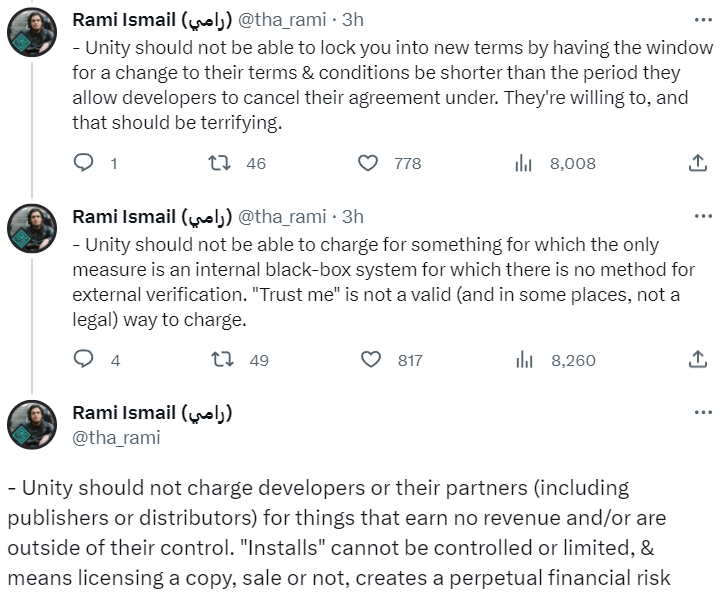
Image credit: Rami Ismail
“It comes down to trust,” Ismail continued. “I don’t think practically many devs will be bankrupted by this, but any system that is sprung on developers that allows them to be financially harmed in any way by their success should not be tolerated by any business looking to build a sustainable future.”
Among Us developer InnerSloth believes that the Runtime Fee will affect studios of all budgets and sizes. The team noted that it could even have to delay content if the new pricing policy goes through, adding that “many developers won’t have the time or means to do the same”
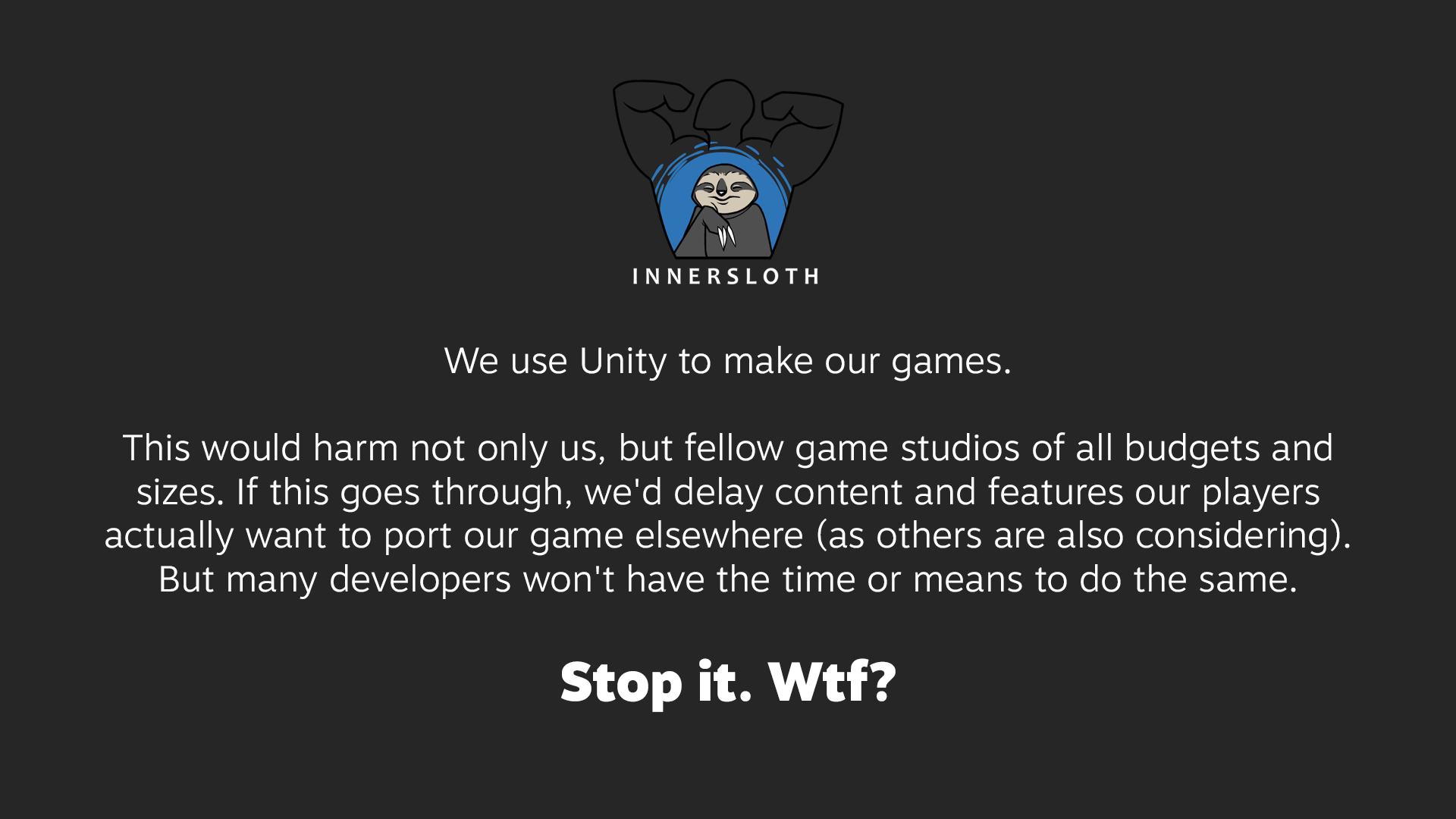
Image credit: InnerSloth
Will some indie devs abandon Unity for another engine?
“This all comes out of the developer’s pocket, but publishers won’t want to be on the hook for it either — expect fewer games to be pitched with Unity going forward,” Sheffield said in his blog post. And here is a sarcastic tweet from indie publisher Devolver Digital, but there’s a grain of truth in every joke.

Image credit: Devolver Digital
Tim Soret also noted that there is no trust left between Unity and developers “The breach of trust is so insane, that it’s impossible to stay with Unity,” the post read. “We can’t commit years of our lives building a massive tech ecosystem upon Unity, just to be told ‘now that you’re trapped, the rules are changing.
Indie studio Aggro Crab, whose upcoming game Another Crab’s Treasure will also be available on Game Pass, called on Unity to reverse the rollout of the Runtime Fee. “This decision puts us and countless other studios in a position where we might not be able to justify using Unity for our future titles,” the message reads. “If these changes aren’t rolled back, we’ll be heavily considering abandoning our wealth of Unity expertise we’ve accumulated over the years and starting from scratch in a new engine.”
Cult of the Lamb developer Massive Monster also mentioned that the Runtime Fee could force the studio to abandon Unity. “This change would result in significant delays since our team would need to acquire an enitrely new skill set,” they said, adding that the new fees “could pose significant challenges to aspiring developers.”
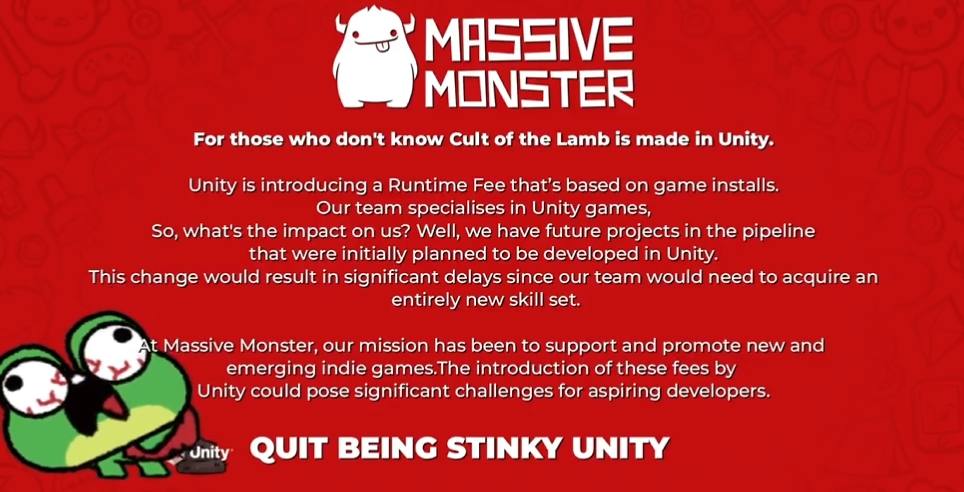
Image credit: Massive Monster
Indie studio Over The Moon Games, known for its puzzle side-scroller The Fall, said the upcoming Runtime Fee gave them the “motivation to finally learn C++.”
“Now I’m in a position where the market is more risky than ever and I have two choices — one with no risk but with profit loss on the back end [Unreal] and one with financial risk and profit loss on the back end, and nebulous boundaries [Unity],” Over The Moon’s post reads.
Although David Szymanski, best known for games like Dusk and Gloomwood, hopes that the changes announced by Unity won’t be as bad as they seem now, he said Butcher’s Creek will be his last game made with this engine.
“Gonna have to throw out almost a decade of experience and a bunch of prototypes and half-finished ideas, and either start from scratch with a different engine, which is sort of like a brain flashbang at the moment, but I hope it will be a positive thing in the long run,” Szymanski wrote, adding that he currently plans to switch to Godot.
Freehold Games co-founder Brian Bucklew noted that he could port the studio’s roguelike Caves of Qud to Godot in four to eight weeks. InnerSloth co-founder Forest Willard agreed, saying that “Among Us gets enough dls per month that I could just hire two whole people to port AU away from Unity instead of them taxing us for 0 added value.”
In the wake of increased attention from developers, Godot project manager Rémi Verschelde warned developers that their decision to abandon Unity and switch to another engine shouldn’t be rushed.
“I love that you’re eyeing Godot, but take your time to weigh the pros and cons,” he said. “It’s a great engine, but no software is perfect and we don’t want you to come to it in panic, and end up frustrated that it might not be the drop-in replacement for what you had to leave behind.”
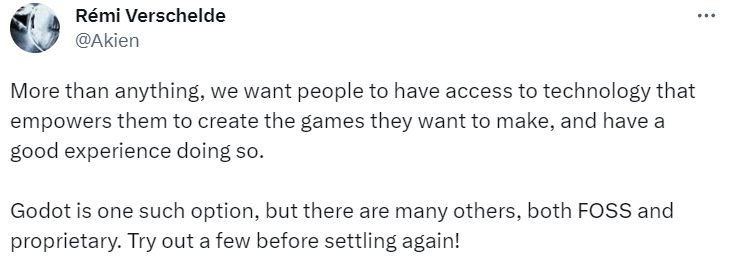
Image credit: Rémi Verschelde
Class-action lawsuit against Unity might be in talks
Strange Scaffold head Xalavier Nelson Jr., known for games like Space World Organ Trading Simulator and El Paso, Elsewhere, wrote on X (Twitter) that “at least one significant group of developers is talking a class-action lawsuit against Unity.”
Despite the lack of details, many developers have already expressed interest in joining. “How do I contact them?” David Szymanski wrote. The list also includes VR dev Blair Renaud, Schell Games senior engineer Ashley Godbold, mobile dev Joshua Wilde, and more.
There is also a post on Reddit, with user PickleJesus123 urging fellow developers to start a class action against Unity. However, no official moves have been made yet.